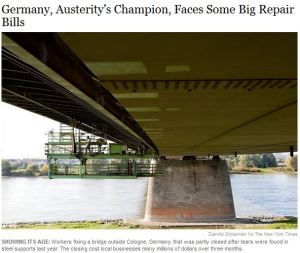Infrastructure research might get a “shot in the arm” over the next decade, but perhaps only because of the deleterious effects of political/economic austerity measures. Perhaps we need to start developing more concepts around the topics of decay and decay-remediation over the next few years.
Suzanne Daley and Alison Small report that austerity in Germany has weakened its infrastructure, one of its most important public investments:
Germany was once known for its superfast autobahns, efficient industry and ability to rally public resources for big projects, like integration with the former East Germany. But more recently, it has been forced to confront a somewhat uncharacteristic problem: Its infrastructure — roads, bridges, train tracks, waterways and the like — is aging in a way that experts say could undermine its economic growth for years to come.
In the years to come, as austerity measures reach a fever pitch (in both popularity and critique), we should expect to hear more about the deleterious effects of austerity on infrastructure. Those of you in the “know” already have seen the wave of such discussion. For a merely a smattering of such discussion, consider American Dave Johnson’s blog, Colin Turner’s work on seeing austerity as a “pro-growth” model of governing infrastructure investments, or Mark Gongloff’s Huffington Post piece linking a bridge collapse with austerity measures, though there is much, much, much, more to say.
This should be a recurrent theme in scholarship in STS, although the topic seems only modestly addressed in our professional literature (with a few notable exceptions).

Pingback: US: D+ | Installing (Social) Order
Pingback: Diagnosing Bridge Collapse | Installing (Social) Order
Pingback: Infrastructure: The New New Deal | Installing (Social) Order
that’s the better mouse trap so what are the hacks for those who want to be of some wider use and not just adding weight/H2O to a sinking ship?
LikeLike
Pingback: Not Durk/Tarde, but Saint-Simon/Comte! | Installing (Social) Order
It is just so hard to voluntarily select this route when “the” University only selectively rewards such behavior. Getting sucked into the morass of politicking is often seen as an indictment of the scientific process (i.e., scholars motivated by politics or personal agenda rather than the research question). Moreover, politics is messy for a scholar, especially a young one, and might very well slow your progress toward publication. Thus, if you want tenure — from the last few tenure track jobs that remain — then you may not get that sort of advice and instead get all manner of encouragement to follow those hobbies.
LikeLike
yep, follow your bliss (or just your should be closeted curiosities) isn’t much of a research agenda in times of crisis, these people need to pitch in a help us out in making things better and follow their hobbies on the weekends…
LikeLike
STS has been surprisingly derelict in that duty, to my mind (myself included); with rare exception, our work on bicycles or Portuguese sailing vessels just does not apply to the contemporary world of politics and decision-making there within.
LikeLike
yeah the gets used, seat at the table thing, is vital otherwise what the hell are folks really doing and why should anyone (especially tax-payers) support it?
LikeLike
I could not — COULD NOT — agree more; in fact, one of the primary theme’s of Jan and I’s last talk at 4S was this: “stop trying to get it right” because being correct does not necessarily imply that that line of thinking will be used; in fact, all sorts of theories are used (in our case, related to states and state theory) that are quite quite far from the ideas we formulate in the Ivory Tower. As a result, our first steps have been to find some theories “out in the wild” — theories as they are used — as a way to update OUR scholarly side of things. Still, the folks that cross-over from academia into decision-making circles in the government and corporate world already know: the theory used is not necessarily the best, it is the one that gets used.
LikeLike
I keep thinking we need a ne(ur)o-pragmatist update on something like reader-response theories where we test the works of critics not just by something like accuracy but more importantly in how they do or do not move people in power to make constructive (pun intended) changes in their works, maybe?
LikeLike
Frankly, it appears the latter is occurring rather than the former.
LikeLike
any of this chatter proving to be of use/appeal yet in political realms where actual decisions are being made about budgets/projects or do we need folks to have sort of Gov.Christie come to Jeezus moment after a major disaster hits them upside the head?
LikeLike
Interesting, related discussion at the Economist: http://www.economistinsights.com/content/achieving-urban-goals-times-austerity-smart-cities
LikeLike